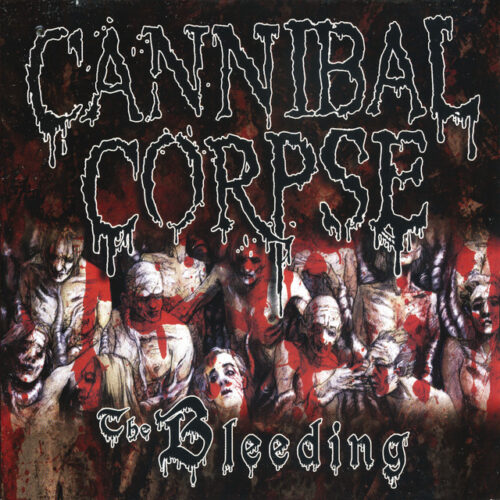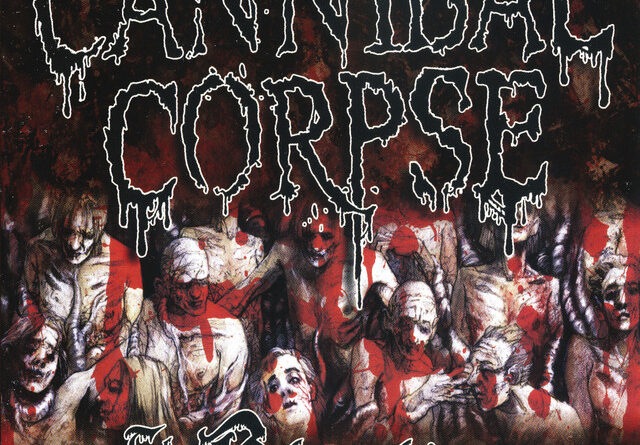HEAVY MUSIC HISTORY: The Bleeding – Cannibal Corpse
At the dawn of the 90’s CANNIBAL CORPSE had only existed for a couple of years. Releasing their first album, Eaten Back To Life in 1990 and subsequent three albums before 1995, the band cemented their relevance during an exciting time for death metal. The trajectory of this otherwise underground genre was skyrocketing; The likes of AUTOPSY, CARCASS and DEATH producing instructions on how to create a seminal album. With growing prominence, 1994’s offering, The Bleeding, slotted in amidst the powerhouses at the time.
While various components make The Bleeding a standout record, previous release, Tomb Of The Mutilated (1992), may be responsible for some of its success. Producing two of the band’s most notable tracks, Hammer Smashed Face and I Cum Blood, the record landed them a cameo in Ace Ventura: Pet Detective and features in popular video game soundtracks. Despite their grotesque lyrical themes and relentless ferocity being favourable among fans, the band would find themselves met with controversy and censorship leading to their music being banned in certain counties. Although Tomb Of The Mutilated nods towards a slight enhancement of complexity, the album very much continued CANNIBAL CORPSE’S prior work and solidified their sound.
Basking in the prosperity of its predecessor, The Bleeding, was released two years later through Metal Blade Records. Landing its place as the fifth top-selling death metal LP in the US, there are a multitude of reasons why The Bleeding is a paramount album in CANNIBAL CORPSE‘s history and their most successful to date. Marking a deviation away from their usual sound and the end of an era, The Bleeding is an entirely unique album in the band’s catalogue. Most significantly, this record would be the last to feature founding member, vocalist and lyrical mastermind, Chris Barnes and original guitarist, Bob Rusay.
There is a distinct shift in style on The Bleeding in comparison to earlier material. For one, the original album artwork is far from graphic, depicting only raw flesh and muscle. Though, the 2016 reissue would later uncover this was part of a larger, more explicit image of a man being ripped apart and devoured by zombies, in typical CANNIBAL CORPSE fashion. As a result of Barnes’ desire to adopt a new musical approach, the record maintains their explosive savagery, but with heightened maturity and a confident understanding of direction. The band’s particular attention to songwriting and accessibility is evident on this album. Rather than blasting through at a thousand BPM, the tracks lack the excessive extremity of previous cuts in favour of captivating riffs and vocals that stick in your head. As such, the vocals on this release are more intelligible in place of indecipherable growls featured on previous releases. However, it is clear that the preceding censorship issues weren’t considered when composing new music as The Bleeding kept up the outlandish poetry. Barnes’ later confirmed this in an interview stating, “I just wrote what I felt in my gut” (MTV Special, Las Vegas, 1994).
Preventing the formation of one long grindy nightmare, each track on The Bleeding conserves its independence, branching away from the regarded monotony of earlier material. Favouring a more technical approach, the enchanting guitar work between new guitarist Rob Barrett and Jack Owen is the best in CANNIBAL CORPSE history to this point. Thanks to the expertise of Scott Burns, the lead and rhythm sections are exceptionally tight, effortlessly bouncing off each other. This riffwork mastery shines through in the groovy thrashings in She Was Asking For It and The Bleeding and even leaves the thick doom-charged sections in Return To Flesh memorable. However, it’s the masterful skill of bassist Alex Webster that really stands out on this record. At no point does the bass fade into the background, triumphantly persevering with the relentless speed and almost taking on the position of a second rhythm guitar.
In exploring a new direction, The Bleeding managed to elevate the band’s sound without losing the underpinning heaviness and unsavoury theming. Albeit, these elements do feel more sophisticated. Just by the names alone, The Pick Axe Murders and Fucked With A Knife highlight the inclusion of these foundations, both featuring sections of fast-paced brutality that you can’t help but to headbang to. At this point in their career, it was pretty well established that their lyrics would encompass unsettling concepts. And while The Bleeding does extend this trend, the lyrics are not announced in muffled grunts. Instead, Barnes switches between high-pitched shrieks and unnerving gutturals, even opting to commence Stripped, Raped and Strangled with a sinister spoken section: “They think they know who I am. All they know is I love to Kill. Face down, dead on the ground. Find me before another is found.”
The Bleeding left behind a legacy, bidding farewell to Chris Barnes. Current vocalist George Fisher would later replace Barnes and be heard on their fifth album, Vile (1996). Even though the Barnes era is highly regarded by some fans, Vile was well received with reviews acknowledging the enhanced complexity and dynamics Fisher induced, livening up and refreshing their sound. Nonetheless, The Bleeding will always be a principal record for CANNIBAL CORPSE. Pushing their boundaries into new realms without abandoning their quintessential prowess, this record tapped into the flourishing wave of death metal, becoming a prominent record of the mid-90s.

The Bleeding was originally released on April 12, 1994 via Metal Blade.
Like CANNIBAL CORPSE on Facebook.

